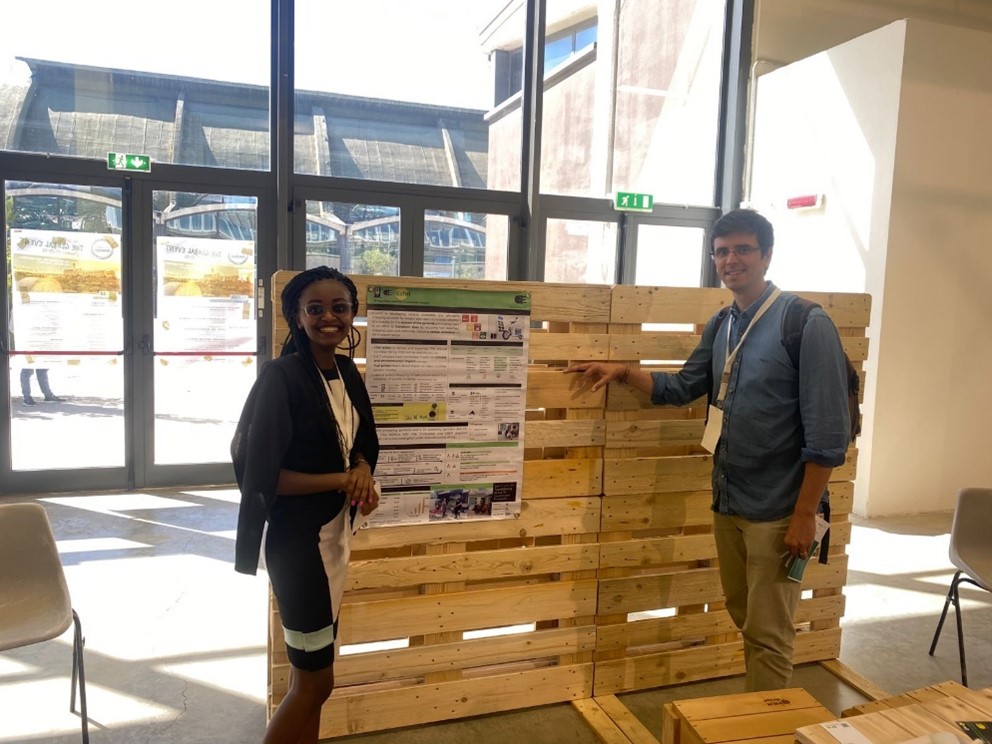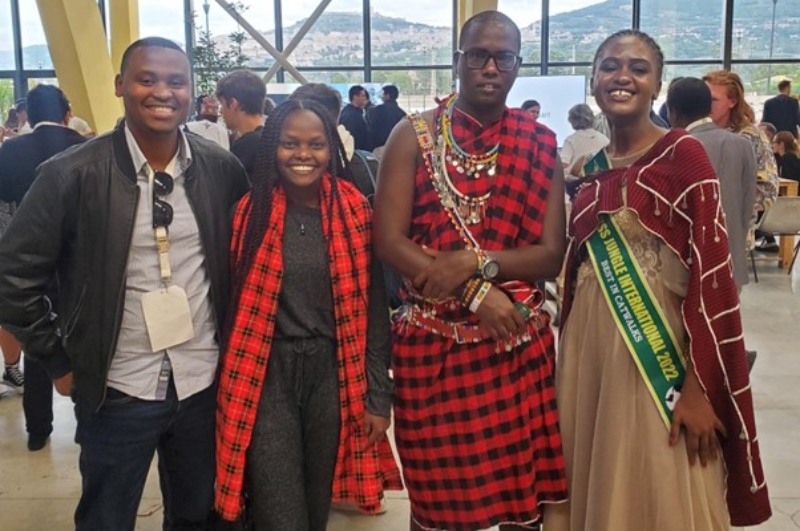

In September 2022, the Jesuit Justice and Ecology Network Africa (JENA) sponsored young economists and entrepreneurs from Africa to attend the Economy of Francesco global event in Assisi, Italy.
The Economy of Francesco is an international movement of young economists, entrepreneurs, and change-makers engaged in a process of inclusive dialogue and global change. The idea is to develop new economics for the 21st century, one that responds to the challenges of our time. In this series, we bring to you the experiences of some of the young Africans who participated in the event.
My name is Janet Wahome, a co-founder of E-Safiri, a Kenyan startup that is fighting climate change and eradicating poverty by developing solar-powered charging hubs. E-Safiri designs, implements, and tests solar charging hubs to power electric 2&3 wheelers, with extra power used for other productive energy use such as phone charging, solar fridges, and community lighting. Prior to joining E-Safiri, I worked in a transport and logistics company that heavily relied on internal combustion engines. The desire to shift to clean and sustainable transport prompted her and two others to launch E-Safiri.
The Economy of Francesco is an economy that calls for a shift from the traditional model that promotes exploitation and injustices to a new model that promotes sustainability; from an economy that kills the environment to an economy that promotes life. In the past, we have experienced unprecedented progress in human indicators and the market system, but we are beginning to experience deep fractures. Income inequality, environmental degradation, loss of species, stress on water, and climate change are beginning to show. These fractures pose negative challenges to human well-being and raise questions about the sustainability of humankind.
The EoF calls for businesses to not only optimize short-term profits for the shareholders but to also create value for the needs of the stakeholders and society at large. Embracing a sustainable economy is not easy at the beginning. However, doing so is good for businesses in the long run. These businesses end up outperforming the rest in terms of earnings, investments, job growth, and revenue. For instance, Natura, Brazil's leading Cosmetics Company has always pursued sustainability since its inception. In 50 years of its existence, it has built a reputation for treating customers, the environment, and suppliers responsibly. The company is well recognized for protecting the biodiversity of the Amazon, where most of the raw materials are extracted to defend human rights and advance social equity. In 2020, despite the effects of Covid-19, Natura's consolidated net revenue rose to R$36.9 billion from R$ 14.44 billion the previous year. The case study of Natura is a clear indication that the Economy of Francesco can be achieved if all businesses take care of the planet and the well-being of people in the society is highly optimized.
I feel a sense of camaraderie because we experience the same problems around the globe, no matter the country, language, or continent. At the Opening Session of the Economy of Francesco 2022, I felt inspired by a series of presentations from different young economists, researchers, and professors. The highlights of the opening session were presentations from young people who continue to fight injustices in their countries. Sayda, a 27-year-old peacekeeper in Colombia narrated how her community had been massacred and displaced from their land because they opposed illicit and industrial projects that destroy their natural wealth. San Jose, a 35-year-old peacekeeper also spoke about the disappearances, massacres, and selective killings in Uraba Colombia instigated by armed groups in a bid to control the gold, petroleum, and oil in the area. Fatima, a 28-year-old peacekeeper spoke about wars, explosions, injustices, and isolation in Iraq. An even more significant injustice was highlighted by Martina, who mentioned how racism, intolerance, and extremism are being normalized in Europe. The multitude of injustices perpetrated against these young people and their communities was infuriating. Also, infuriating are the many calls for justice by the international community, while the interest of the economic groups ends up manipulating information so that their plans are protected.
The speech by Pope Francis was also amazing. It was a beautiful experience to hear his encouragement and expression of satisfaction with the work done by young people in creating the Economy of Francesco. Some of his words left a deep impression on me "you young people, with the help of God, know what to do, you can do it; young people have done this before in the course of history," Yes, young people hold the key to a sustainable and inclusive economy.
As part of the Energy and Poverty village, I look forward to implementing projects that substitute fossil fuels with renewable energy. With Kenya’s economy being fuel driven, a fuel shortage portends far-reaching effects on the poor due to increased costs of basic food and increased transport prices. We need to end our reliance on fossil fuels and transition to renewable energy. In his letter Laudato Si, Pope Francis also emphasizes the need to substitute fossil fuels with renewable energy sources. Renewable sources such as solar, and winds are good alternatives because they are not affected by geopolitics and have performed well in the energy sector. I understand that the upfront cost is high and it takes time to bring in independent power producers to put up large gigawatts size projects. However, we can start making a difference by adopting local decentralized small kilowatts size plants.My expectations at EoF were to meet smart and inspiring minds from all over the world and share more ideas on how to transform the economy. And it happened, from the beginning of the conference to the last session, therefore, my expectations were indeed met. I managed to interact with other young economists with different backgrounds and life experiences and engaged in interesting discussions on how to adopt a stakeholder economy. I was incredibly lucky to be part of the EoF, and I am sure those friendships will last a lifetime. In general, I dream of a new economy that promotes happiness in the world. Today millions of people are affected by job losses, diseases, inequality, carbon emissions, and war. The world of economics can promote happiness by pursuing straightforward policy goals that emphasize the need for equality, protection of biodiversity, democracy, peace, and sustainable businesses.
EoF is not only about financial metrics, it focuses on the well-being of people in society. Unfortunately, the current economic model values profit, wealth, and expansion above everything else. This has led to an increased gap between the rich and poor and the destruction of our environment. Despite the horrific side effects, capitalist economies continue to expand. There is an urgency to transform the world in a way that allows human beings to flourish. Young people can help push the EoF agenda using tools like social media to raise awareness, and activism and also push for the right policies. In addition, they can be part of the practical solutions, for example making sustainable consumer choices and also pursuing professional paths that seek to achieve sustainability. Every young person who desires an equitable world should join the EoF and help advance the agenda.
Select Payment Method
Pay by bank transfer
If you wish to make a donation by direct bank transfer please contact Fr Paul Hamill SJ treasurer@jesuits.africa. Fr Paul will get in touch with you about the best method of transfer for you and share account details with you. Donations can be one-off gifts or of any frequency; for example, you might wish to become a regular monthly donor of small amounts; that sort of reliable income can allow for very welcome forward planning in the development of the Society’s works in Africa and Madagascar.
Often it is easier to send a donation to an office within your own country and Fr Paul can advise on how that might be done. In some countries this kind of giving can also be recognised for tax relief and the necessary receipts will be issued.


